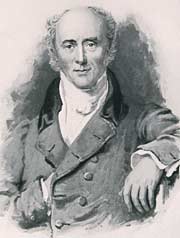Charles Grey, 2nd Earl Grey
Charles Grey, 2nd Earl Grey KG, PC ( born March 13, 1764 in Fallodon in Alnwick, Northumberland, † July 17, 1845 in Howick ) was a British nobleman and statesman. He was a member of the Whig party.
Life and work
Charles Grey was educated at the University of Cambridge at Eton College and at Trinity College, then traveled to France, Spain and Italy, and was only 22 years old, elected for Northumberland in the House of Commons. In his maiden speech to William Pitt's commercial treaty with France in 1787, he showed excellent knowledge of the French state. He was initially the Prince of Wales (later George IV ) closer friends, but soon arose between the two voltage because Grey refused in favor of the prince to commit an act of dubious integrity.
Since then, his relationship was to the prince with a cold; but nevertheless he was a zealous defender of the rights of the same, as in 1788 when the illness of the king a regency should be appointed. 1792 Grey began the struggle for parliamentary reform, by he presented the famous petition of him with donated society of the friends of the people who asked for the removal of abuses in the British system of representation, as well as to restore a three-year parliaments and to include provisions for the reduction of election expenses. In this and other petitions of the same species Grey built in 1793 a request for a committee of inquiry, but the same was rejected. After 1806 Grey's father Earl had been raised, Grey received the courtesy title Viscount Howick, was first after Pitt's death Lord of the Admiralty in the government of all the talents and after Fox's successful entry a few months later foreign minister.
After discharge of this Whigministeriums and the formation of the government Portland Grey sat for 23 years in opposition and worked especially with the suppression of the slave trade. As his father's heir he had entered in November 1807 the House of Lords, where he took over the leadership of the opposition, without, however, maintained its earlier popularity all. Twice, in 1809 and 1812, was negotiated with him because of the assumption of a ministerial post; but the negotiations broke down both times: in 1809, because he could not hope to obtain the permission of the king to the Catholic Emancipation, in 1812, because its call for the first court offices to be filled in order to break the influence of the camarilla, was rejected.
In 1815, after Napoleon's return from Elba, Grey defended France's right to assign its Constitution itself, and spoke with eloquence against the interference in the affairs of the country. During the infamous trial of Queen Caroline, consort of George IV, to Grey distinguished as their defender.
Even against the government Canning he remained in opposition, but supported Wellington's opposition to the Corn Laws, which cost him much of his prestige among the people, he could only difficult to recover by his appearance for the Emancipation of the Catholics.
After the Wellington government had disbanded in 1830, Grey resigned as prime minister to head a new, which to " parliamentary reform, reduction of state loads and non-interference in the affairs of foreign countries " pledged. The wanted introduced by his Government Reform Act, with which Grey reform the come into disrepute right to vote and to abolish a larger number of rotten boroughs, was adopted in 1832 by the House of Commons, but rejected by the Lords.
Then Grey announced his retirement, but resigned after a few days in the government one after Wellington had abandoned its opposition to the bill, whereupon the latter entered into force in June 1832. Less corresponded Grey his program in terms of reducing government spending, and by his poor law and its disciplinary actions against Ireland he even drew such heavy criticism that he finally left office in July 1834.
Among the important measures of his administration still include the abolition of the monopoly of the East India Company and the emancipation of Africans in the British colonies, which of course, the land cost 20 million pounds sterling. Still about two years after his resignation visited Lord Grey occasionally the House of Lords; towards the end of 1836, he withdrew completely. He died on 17 July 1845.
Grey was with Mary Ponsonby, a daughter of William Ponsonby, 1st Baron Ponsonby ( 1744-1806 ), married, with whom he had 11 sons and five daughters. He also had a number of affairs. With Georgiana Cavendish, Duchess of Devonshire, he had an illegitimate daughter, Eliza Courtney.
After Charles Grey Earl Grey tea blend that was named. After his wife Mary Elizabeth Grey Lady Grey tea blend that was named.
Grey's affair with Georgiana Cavendish was presented The Duchess (2008) in the film.









,_by_Henry_Bone.jpg/220px-Charles_Grey_(1764-1845),_by_Henry_Bone.jpg)
